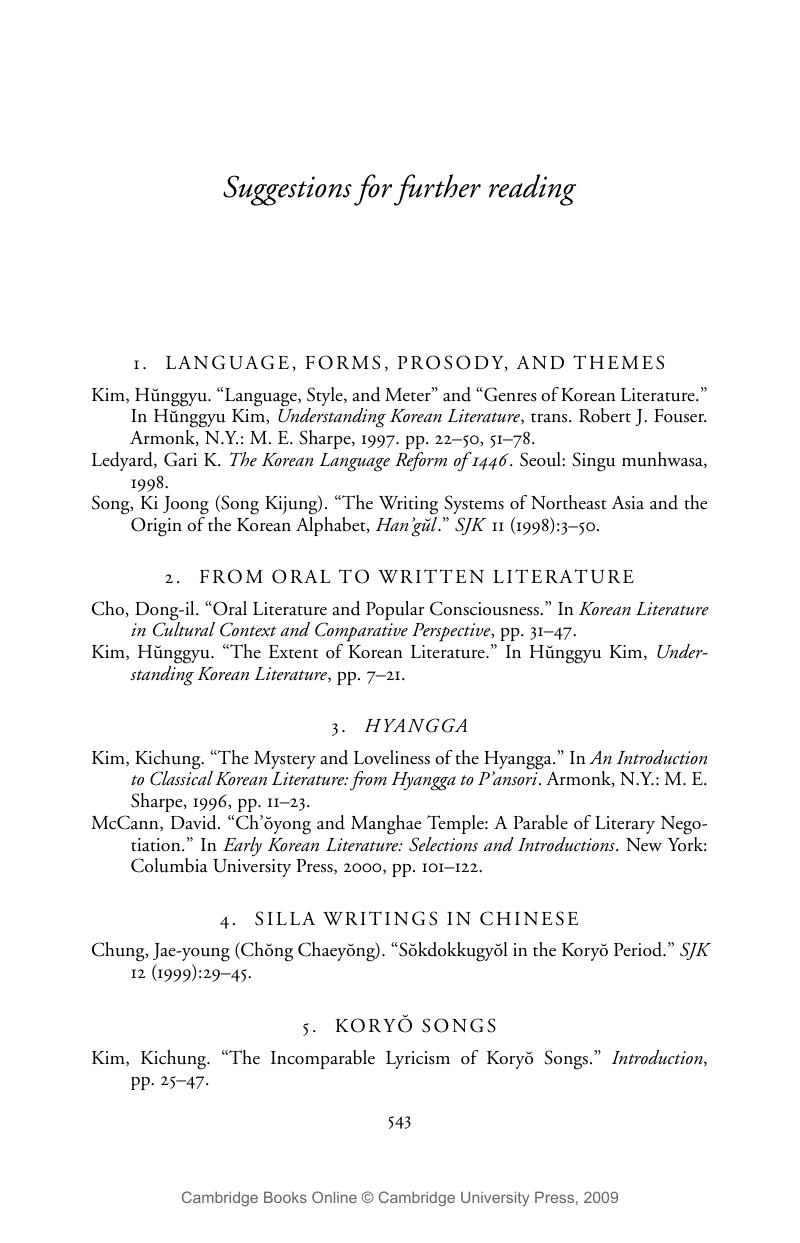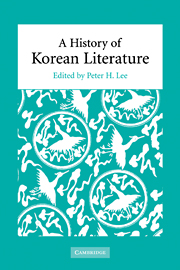Book contents
- Frontmatter
- Contents
- List of illustrations
- List of contributors
- Preface
- Note on the text
- Korean dynasties
- Glossary
- East Asia
- Principal places in works discussed
- Introduction
- 1 Language, forms, prosody, and themes
- 2 From oral to written literature
- 3 Hyangga
- 4 Silla writings in Chinese
- 5 Koryŏ songs
- 6 Koryŏ writings in Chinese
- 7 Early Chosŏn eulogies
- 8 Early Chosŏn sijo
- 9 Early Chosŏn kasa
- 10 Late Chosŏn sijo
- 11 Late Chosŏn kasa
- 12 Chosŏn poetry in Chinese
- 13 Chosŏn fiction in Chinese
- 14 Chosŏn fiction in Korean
- 15 P'ansori
- 16 Folk drama
- 17 Literary criticism
- 18 Early twentieth-century poetry
- 19 Early twentieth-century fiction by men
- 20 Early twentieth-century fiction by women
- 21 Late twentieth-century poetry by men
- 22 Late twentieth-century poetry by women
- 23 Late twentieth-century fiction by men
- 24 Late twentieth-century fiction by women
- 25 Literature of North Korea
- Bibliography
- Suggestions for further reading
- Index
- References
Suggestions for further reading
Published online by Cambridge University Press: 22 September 2009
- Frontmatter
- Contents
- List of illustrations
- List of contributors
- Preface
- Note on the text
- Korean dynasties
- Glossary
- East Asia
- Principal places in works discussed
- Introduction
- 1 Language, forms, prosody, and themes
- 2 From oral to written literature
- 3 Hyangga
- 4 Silla writings in Chinese
- 5 Koryŏ songs
- 6 Koryŏ writings in Chinese
- 7 Early Chosŏn eulogies
- 8 Early Chosŏn sijo
- 9 Early Chosŏn kasa
- 10 Late Chosŏn sijo
- 11 Late Chosŏn kasa
- 12 Chosŏn poetry in Chinese
- 13 Chosŏn fiction in Chinese
- 14 Chosŏn fiction in Korean
- 15 P'ansori
- 16 Folk drama
- 17 Literary criticism
- 18 Early twentieth-century poetry
- 19 Early twentieth-century fiction by men
- 20 Early twentieth-century fiction by women
- 21 Late twentieth-century poetry by men
- 22 Late twentieth-century poetry by women
- 23 Late twentieth-century fiction by men
- 24 Late twentieth-century fiction by women
- 25 Literature of North Korea
- Bibliography
- Suggestions for further reading
- Index
- References
Summary

- Type
- Chapter
- Information
- A History of Korean Literature , pp. 543 - 550Publisher: Cambridge University PressPrint publication year: 2003

